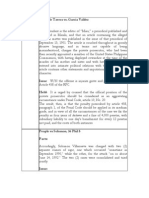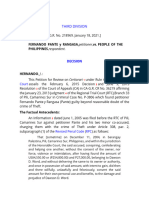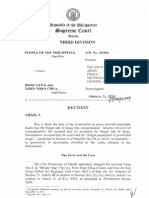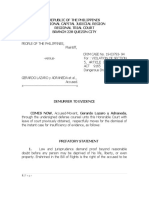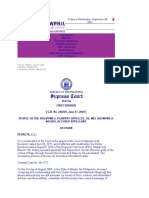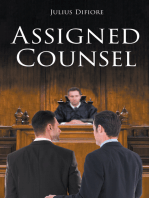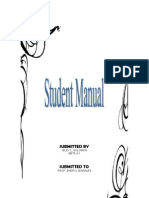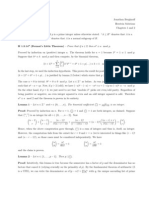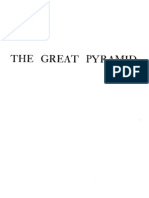G.R. No. 218969 Pante V People
G.R. No. 218969 Pante V People
Uploaded by
Frances Ann TevesCopyright:
Available Formats
G.R. No. 218969 Pante V People
G.R. No. 218969 Pante V People
Uploaded by
Frances Ann TevesOriginal Description:
Original Title
Copyright
Available Formats
Share this document
Did you find this document useful?
Is this content inappropriate?
Copyright:
Available Formats
G.R. No. 218969 Pante V People
G.R. No. 218969 Pante V People
Uploaded by
Frances Ann TevesCopyright:
Available Formats
Today is Monday, May 22, 2023
Constitution Statutes Executive Issuances Judicial Issuances Other Issuances Jurisprudence International Legal Resources AUSL Exclusive
G.R. No. 218969, January 18, 2021,
♦ Decision, Hernando, [J]
♦ Separate Concurring Opinion, Delos Santos, [J]
THIRD DIVISION
[ G.R. No. 218969, January 18, 2021 ]
FERNANDO PANTE Y RANGASA PETITIONER, VS. PEOPLE OF THE PHILIPPINES, RESPONDENT.
DECISION
HERNANDO, J.:
This Petition for Review on Certiorari1 under Rule 45 of the Rules of Court assails the February 6, 2015
Decision2 and June 9, 2015 Resolution3 of the Court of Appeals (CA) in CA-G.R. CR No. 36219 affirming the
Januaiy 23, 2013 Judgment4 of the Regional Trial Court (RTC), Branch 33 of Pili, Camarines Sur in Criminal Case
No. P-3806 which found petitioner Fernando Pante y Rangasa (Pante) guilty beyond reasonable doubt of the crime
of Theft. The Factual Antecedents: An Information5 dated June 1, 2005 was filed before the RTC of Pili, Camarines
Sur against petitioner Pante and his two minor co-accused, charging them with the crime of Theft under Article 308,
par. 2, subparagraph (1) of the Revised Penal Code (RPC) as follows:
That [sometime] on December 11, 2004, in barangay Palestina, Pili, Camarines Sur, Philippines, and within the
jurisdiction of the Honorable Court, the said accused, conspiring, confederating and helping one another, without the
consent of the owner, nor force, violence or intimidation, after having found the amount of US$4,550.00 or
(P254,800.00) and P27,000.00, belonging to Dawson D. Word, and without delivering the same to its owner or
authority, and once in possession of said amount, with intent to gain, did then and there willfully, unlawfully and
feloniously, convert the said amount for their own personal use and benefits, to the damage and prejudice of
Dawson D. Word. ACTS CONTRARY TO LAW.6
Upon arraignment, Pante and his two co-accused entered separate pleas of "not guilty." Version of the
Prosecution: On December 10, 2004, Dawson Word (Word) dropped by the People's Mart in Naga City, Camarines
Sur with his househelper, Angie Beroño (Beroño), to buy fish. He was carrying US$4,550.00 and P27,000.00
bundled together in a rubber band placed on his lap. Word gave Beroño P1,000.00 to buy fish and arranged his
remaining money while waiting inside the car. When Beroño returned, Word placed the bundle of money on his lap
between his legs and drove back to his apartment.7 He parked his car in front of his residence and forgot the money
that he placed on his lap.8 Apparently, upon alighting from the car, the bundled money fell on the road near his
vehicle. At about 5:30 a.m. the following morning, a bakery worker noticed a bundle of money lying on the ground
near Word's car. Meanwhile, one of Pante's co-accused, who was riding his bike outside, also noticed the bundle of
money and picked it up before going inside his house.9 At around 8:00 a.m., Word realized that the money that he
had placed on his lap was missing.10 He began searching for it in his car but could no longer find it. With the help of
his landlord, Word learned that Pante's minor co-accused picked up the bundled money near his car.11 On
December 21, 2004, Word sought the help of the police in the recovery of his money. Upon investigation, it was
found that Pante's minor co-accused was indeed the finder of the money. The police headed to the minor's
residence where accused-minor admitted that he found the bundle of money under Word's car.12 He also averred
that the money was shared among his other co-accused, who is a cousin and also a minor, Pante, and himself. His
parents returned the US$1,300.00 to Word, as evidenced by the receipt13signed by his father. On the same day, the
police went to the house of the other accused- minor, who admitted getting US$500.00 but could no longer return
the same because he already spent it.14 Thereafter, the police proceeded to the house of Pante, who also admitted
that he received US$1,700.00. He was able to return US$300.00, P4,660.00, one unit of JVC component, and a gas
stove with a tank. Pante also gave a receipt15 from Monton Hardware, where he bought construction materials.
Seeing that some of the materials were already used, the police did not retrieve them anymore. Thereafter, all the
money and items recovered from the three accused were returned to Word. Version of the Defense: The accused-
minor testified that while riding his bike in the morning of December 11, 2004, he found 30 pieces of US$100 bills
near Word's car, but no Philippine currency.16 He kept the money in his pocket and proceeded to deliver bread.
Afterwards, he went to his co-accused cousin to ask him what to do with the money. While they were talking, Pante
overheard their conversation. Being the only adult among them, Pante told them to get the money and proceed to
the tree house. On their way to the tree house, Pante grabbed the money and counted it. Thereafter, he got 17
pieces of US$100 dollar bills for himself. His co-accused cousin received US$500.00 while he kept US$2,350.00.
Pante went home with his share and never returned.17 The other accused-minor admitted that his cousin gave him
US$500.00 on the same day Word lost his money. However, he gave it back to his cousin so he could return it to
Word. On the other hand, Pante testified that on December 11, 2004 at around 6:30 p.m., he saw his two co-
accused pass by the back of the bakery where he was working. They were carrying items like Playstation and new
shoes. He asked them where they got the money to buy those things and learned that one of them found a bundle
of dollar bills. He admitted receiving 10 dollar bills from his co-accused as his "balato." He kept the money for a few
days then exchanged them to Philippine currency. He used the money to buy a JVC component, a gas stove with a
tank, and a CD cassette.18 When police authorities came to his house on December 21, 2004 demanding return of
the money, he told his wife to get the remaining US$300.00 and P4,660.00 and turned it over to them.19 Ruling of
the Regional Trial Court: In its January 23, 2013 Judgment, the RTC found all three accused guilty beyond
reasonable doubt of the crime of Theft. The evidence submitted by the prosecution proved that Word lost his money
and that the accused-minor was the finder thereof, and who shared the cash he found with his co-accused cousin
and Pante, the latter both knowing where the money came from. While the trial Court was convinced that Word lost
dollar bills in the amount of US$4,450, the prosecution failed to prove that he also lost money in Philippine currency.
It found that Pante got US$1,700.00, while the two accused-minor netted US$500.00 and US$2,350.00 each. The
trial court noted that Pante even instructed the two minors not to return the money. Instead of encouraging them to
return the cash, Pante got a portion for himself and headed home. Thus, the trial court did not give credence to
Pante's position that he did not have any interest in keeping the money. Neither can his act of returning the money
be considered voluntary since he already knew that Word was looking for his lost money and he only returned it
upon the arrival of police authorities in his house. The dispositive portion of the RTC's Judgment20 insofar as
petitioner Pante is concerned, reads:
WHEREFORE, in view of all the foregoing judgment, judgment is hereby rendered as follows: x x x x 3. Finding the
accused FERNANDO PANTE, "GUILTY" beyond reasonable doubt of the crime of theft under Article 308, par. 1 of
the Revised Penal Code and imposing the penalty of imprisonment ranging from 2 years 4 months and 1 day of
prision correctional as minimum to 9 years and 1 day of prision mayor as maximum. He is ordered to pay the private
complainant Dawson Word the sum of P59,120.00 as actual damages. SO ORDERED.21 (Emphasis in the original)
Aggrieved, Pante appealed22 the judgment of conviction before the CA, arguing that the prosecution did not prove
his guilt beyond reasonable doubt. First, the prosecution did not present any proof of ownership over the money that
Word had allegedly lost.23 Moreover, he argued that Word's knowledge of Pante's participation in the crime was
based solely on his co-accused's averments24 which are only circumstantial evidence that cannot warrant his
conviction. Lastly, Pante posited that there was no unlawful taking of the money on his part because the finder of the
lost money was his co-accused and not himself. Not knowing where it came from, he averred that he did not have
any intent to take money belonging to another.25 On the other hand, the People, through the Office of the Solicitor
General (OSG), maintained that Pante's guilt was clearly established beyond reasonable doubt. No less than the
petitioner himself admitted in open court that he knowingly received US$1,000.00 from the lost money.26 His co-
accused also testified that Pante actually took US$1,700.00 and insisted they keep the money to themselves.27 In
fact, Pante's act of returning the items purchased using Word's money, and the remaining cash amounting to
US$300.00 and P4,660.00, support such allegations. The OSG further contended that Pante is considered a "finder
in law" and guilty of Theft even if the original finder of the money was his co-accused because he failed to return the
same despite knowledge that it was lost property.28 Ruling of the Court of Appeals: The CA, in its assailed February
6, 2015 Decision,29 affirmed the RTC's ruling. The dispositive portion thereof reads:
WHEREFORE, premises considered, the instant appeal is hereby DENIED. The Judgment dated January 23, 2013
of the Regional Trial Court, Branch 33, Pili, Camarines Sur finding accused-appellant Fernando Pante y Rangasa
guilty beyond reasonable doubt of the crime of Theft defined and penalized under Article 308, par. 2, subpax. (1) of
the Revised Penal Code and to pay private complainant Dawson Word the sum of P59,120.00 as actual damages
is AFFIRMED WITH MODIFICATION in that appellant is ordered to suffer the penalty of imprisonment of 2 years 4
months and 1 day of prision correccional, as minimum to 13 years of reclusion temporal, as maximum. SO
ORDERED.30 (Emphasis in the original)
Undeterred, Pante filed the instant the Petition for Review on Certiorari31 raising the following –
Issues:
(A) WHETHER THE [CA] ERRED IN AFFIRMING THE CONVICTION OF THE PETITIONER FOR THE CRIME
CHARGED DESPITE THE PROSECUTION'S FAILURE TO PROVE HIS GUILT BEYOND REASONABLE DOUBT.
(B) WHETHER THE [CA] ERRED IN CONVICTING THE PETITIONER FOR THE CRIME CHARGED DESPITE
THE PROSECUTION'S FAILURE TO ESTABLISH THAT HE CONSPIRED WITH [HIS CO-ACCUSED] IN THE
COMISSION OF THE CRIME OF THEFT.32
Our Ruling
The Petition is unmeritorious. The CA correctly found that the prosecution sufficiently established Pante's guilt
beyond reasonable doubt of the crime of Theft. Under Article 308, par. 2 (1) of the RPC, Theft is also committed by
one's failure to deliver lost property to its owner or local authorities.33 In this kind of Theft, it is essential to prove: 1)
the finding of lost property; 2) the failure of the finder to deliver the same to the local authorities or its owner.34 In the
case at bar, both the trial court and the appellate court found that the prosecution witnesses were able to prove that
Word lost his bundled money after alighting from his car in front of his residence and forgetting that he had placed
them in between his legs. Such fact was corroborated by the prosecution witness who testified that he positively saw
the accused-minor pick up the bundle of money under Word's car. In the same vein, all three accused admitted that
it was the accused-minor who found the bundle of money in front of the bakery, which they later divided among
themselves in the following manner: US$1,700.00 for Pante; and US$500.00 and US$2,350.00 for each of the two
accused-minor. Despite knowing that the money did not rightfully belong to them, Pante encouraged the two minor
accused to keep the money for themselves. He also appropriated the money for himself by buying various items
such as a JVC component, gas tank, and construction materials. He only returned the remainder of the money to
Word when police authorities showed up in his house.35 Time and again, this Court has held that greater weight is
given to the positive identification of the accused by the prosecution witness than the accused's denial and
explanation concerning the commission of the crime.36Mere denials are only self-serving evidence whose
evidentiary weight cannot outweigh the declaration of credible witnesses who testified on affirmative matters.37 In
relation thereto, findings of facts of the trial court, its calibration of the testimonial evidence of the parties as well as
its conclusion on its findings, are accorded high respect if not conclusive effect.38 This is because of the unique
advantage of the trial court to observe, at close range, the conduct, demeanor and deportment of the witness as
they testify. 39 This rule applies even more when such findings are affirmed by the appellate court. When the trial
court's findings have been affirmed by the appellate court, said findings are generally binding upon this
Court.40 Anent Pante's argument that he cannot be convicted for Theft because he is not the finder of the lost
property, we are not persuaded. The question of whether criminal appropriation of found property can be committed
by a person other than the one by whom the property is first found has been lengthily discussed and answered in
the affirmative in People v. Avila,41 viz.:
From a comparison of the definitions given above it is obvious that the most fundamental notion in the crime of theft
is taking of the thing to be appropriated into the physical power of the thief, which idea is qualified by other
conditions, such as that taking must be effected animo lucrandi and without the consent of the owner; and it will be
here noted that the definition does not require that the taking should be effected against the will of the owner but
merely that it should be without consent, — a distinction of no slight no sight importance. Upon these considerations
it is evident that the taking and appropriation of a thing by one who finds it, knowing the same to have been
misplaced or lost by the true owner, and with acknowledge of his identify, is legitimately within to the second
subsection article 517 of the Penal Code the authors of the code have merely extended the general definition to a
special case about which otherwise some doubt might have existed; and we cannot impute to them the clumsy
mistake of having imported into the law of theft a form of offense foreign to that conception and which should
properly have been incorporated in the chapter dealing with estafa. What has been said is of the greatest practical
importance in dealing the problem now in hand, for it determines the proper point of view for the correct
interpretation of the provision relating to the theft of found property; namely, the provision should be interpreted
according to its true spirit and conformably with the doctrines that inform it. If we had discovered that this form of
theft is really a species of estafa wrenched from its proper associations and artificially placed under a heading where
it does not belong, much could be said in favor of a strict and literal interpretation; but when it is made to appear that
the criminal misappropriation of found property is theft upon general principles of jurisprudence and not some other
crime, it becomes obvious that the provision in question should be applied in accordance with its true spirit. What
then is the meaning of the second subsection of article 517, in so far as it affects the case before us? The words
used in the law are literally these: "Those are guilty of theft: ... 2. Who, finding a lost thing, and knowing who the
owner is, appropriate it with intent to gain." The gist of this offense is the furtive taking and misappropriation of the
property found, with knowledge of its true ownership; and the word "finding" (in Spanish, encontrandose) must not
be treated as a cabalistic or sacramental first finder. The furtive appropriation of the found property, under the
conditions stated, is the principal thing. In the case before us, the accused if not the actual finder, occupied towards
the purse, from the time he took it into his hands, precisely the same relation as if he had picked it up himself. The
purpose of the law is to protect the owner of the lost thing from appropriation by the person into whose hands it may
come, with knowledge of its ownership. The accused was a finder in law, if not in fact; and his act in appropriating
the property was of precisely the same character as if it had been originally found by him.42 x x x x The same writer
then passes on to a proposition more directly connected with the case now before us, since it relates to the act of
misappropriation by one who receives the property by voluntary substitution from the actual finder. Upon this the rule
there formulated is this: "One who receives property from the finder thereof assumes, in legal contemplation, by
voluntary substitution, as to the property and the owner, the relation occupied by the finder, placing himself in the
finder's stead. In such a case, whether the person taking the property is guilty must be determined on the same
principles that govern in the case of the actual finder." (17 R. C. L., 36.) In Allen vs. State (91 Ala., 19) some children
found a pocketbook containing money and certain papers sufficient to identify the owner. Upon arriving home, the
children delivered the purse to their father, who converted it of his own use. It was held that the accused was
properly convicted and that his guilt was to be determined by the same principles that would have government if he
had been the actual finder. In the course of the opinion the following language was used:
"... Finding it, and its delivery to the defendant by the finder, did not deprive the money, as to the owner of the
character status of lost property; the ownership remained in him, drawing to it, constructively, the right of
possession. When defendant took the money from his children, he knew it had been lost, and took it as such. It is
manifest the children had no felonious intent, and properly delivered the money to their father for his disposition. By
receiving it from his children, knowing it was lost, defendant assumed, in legal contemplation, by voluntary
substitution, as to the money and the owner, the relation occupied by the finders, placing himself in their
stead. Otherwise a person knowingly receiving lost properly from the finder, who had no intent to steal, with the
felonious intent to appropriate it to his own use, escapes punishment. In such case, whether or not the person taking
the money principles which govern in the case of the actual finder."43 (Emphasis supplied)
In fine, a "finder" under Article 308, par. 2(1) of the RPC is not only limited to the actual finder of the lost
property44 since the gist of the offense is the furtive taking and misappropriation of the property found 45 Though not
the actual finder, there is no dispute that Pante knew for a fact that his two co-accused minor did not own the subject
money. He knew for a fact that his co-accused minor merely found the money along the road while the latter was
delivering bread.46 Instead of returning the money, Pante convinced his co-accused minors not to return the money
and to divide it among themselves. At that moment, Pante placed himself precisely in the situation as if he was the
actual finder. Otherwise stated, petitioner was a "finder in law," if not in fact; and his act in appropriating the money
was of precisely of the same character as if it had been originally found by him.47 His criminal intent to commandeer
the money found was altogether clear at that point. The rationale for the "finder in law" concept is not difficult to
fathom. It is precisely to protect the owner of the lost property in the event the lost property is transferred from one
individual to another and to prevent the "finder in law" from escaping liability by claiming that he was not the actual
finder thereof but was merely entrusted custody thereof by someone who had no intention to appropriate the same.
"Otherwise a person knowingly receiving lost property from the finder, who had no intent to steal, with the felonious
intent to appropriate it to his [or her] own use, escapes punishment. In such case, whether or not the person taking
the money is guilty of [theft] must be determined on the same principles which govern in the case of the actual
finder."48 Having obtained possession of Word's lost money, Pante had the opportunity and the obligation to return
the lost property to its rightful owner or to the local authorities, but he unjustifiably refrained from doing so. Assuming
for the sake of argument that he did not know that the money belonged to Word, Pante would still be held liable for
Theft for failing to return the amount. This is because the RPC does not require that the thief must know the owner
of the lost property.49 This is precisely why the subject penal provision gave the finder the option to return the lost
property not only to the owner thereof but also to the local authorities.50 As to the second issue, this Court notes that
petitioner raised the issue on conspiracy for the first time on appeal. On this point, we heed Rebadulla v.
Republic,51 where it was pronounced that:
It is well-settled that no question will be entertained on appeal unless it has been raised in the proceedings below. ℒαwρhi৷
Points of law, theories, issues and arguments not brought to the attention of the lower court, administrative agency
or quasi-judicial body, need not be considered by a reviewing court, as they cannot be raised for the first time at that
late stage. Basic considerations of fairness and due process impel this rule. Any issue raised for the first time on
appeal is barred by estoppel.52
Clearly, issues raised for the first time on appeal will not be entertained because to do so would be contrary to the
principles of fairness and due process.53 As such, we agree with the findings of the RTC and the CA in finding
petitioner guilty beyond reasonable doubt of the crime of Theft. However, this Court finds it necessary to modify the
penalty to be imposed upon petitioner pursuant to Republic Act (RA) No. 10951,54 which became effective during
the pendency of the case.55 The Act provides that its retroactivity shall be given effect insofar as it is favorable to the
accused or person serving sentence by final judgment.56 Hence, it is applicable to petitioner's case. Given that the
value involved in this case is P59,120.00, the penalty under Article 309 of the RPC, as amended by Section 81 of
RA No. 10951, is prisión correccional in its minimum and medium periods57 which ranges from six (6) months and
one (1) day to four (4) years and two (2) months.58Applying the Indeterminate Sentence Law, the minimum term of
the penalty shall be taken from the penalty next lower in degree ie., arresto mayor in its medium and maximum
periods,59 or anywhere from two months and one day to six (6) months. Hence, petitioner must suffer a minimum
indeterminate penalty of four months and 20 days of arresto mayor, as minimum to two (2) years, eleven (11)
months, and ten (10) days of prision correccional, as maximum. Moreover, in accordance with prevailing
jurisprudence, the amount of P59,120.00 shall earn interest at the rate of six percent (6%) per annum from finality of
this Decision until fully paid.
WHEREFORE, the Petition for Review on Certiorari is DENIED for lack of reversible error on the part of the Court of
Appeals. The February 6, 2015 Decision and June 9, 2015 Resolution of the Court of Appeals in CA-G.R. CR No.
36219 are hereby AFFIRMED WITH MODIFICATION in that petitioner Fernando Pante y Rangasa is sentenced to
suffer the penalty of imprisonment of four (4) months and twenty (20) days of arresto mayor, as minimum, to two (2)
years, eleven (11) months, and ten (10) days of prision correccional, as maximum. He is also ordered to pay private
complainant the amount of P59,120.00 as actual damages, with interest at the rate of six percent (6%)
per annum from date of finality of this Decision until fully paid.
SO ORDERED.
Leonen, (Chairperson), and Inting, JJ., concur, Delos Santos, J., please see separate concurring opinion. Rosario,
J., on official leave.
Footnotes
1
Rollo, pp. 10-27.
2
CA rollo, pp. 67-83; penned by Associate Justice Ramon R. Garcia and concurred in by Associate Justices
Leoncia R. Dimagiba and Maria Elisa Sempio Diy.
3
Id. at 105-106.
4
Records, pp. 327-338; penned by Presiding Judge Marvel C. Clavecilla.
5
Id at 1-2.
6
Id. at 1.
7
TSN, July 18, 2008, pp. 5-6.
8
TSN, March 13, 2008, p. 26.
9
Id.
10
Id. at 27.
11
TSN, July 18, 2008, pp. 5-6.
12
Records, p. 11. See Joint Affidavit of SPO3 Jovito B. De Castro, SPO3 Pedro D. Corporal, and PO2
Herenerio Z. Burgos
13
Id. at 189.
14
TSN, October 3, 2008, pp. 4-6.
15
Records, pp. 190-191.
16
TSN, May 19, 2010, PP. 9-10.
17
TSN, July 1, 2010, pp. 3-12.
18
TSN, August 10, 2011, pp. 5-8.
19
Id. at 9-11.
20
Records, pp. 327-338; see also rollo, pp. 65-76.
21
Id. at 338.
22
CA rollo, pp. 18-32.
23
Id. at 31.
24
Id.
25
Id.
26
TSN, August 10, 2011, pp. 6-8.
27
TSN, July 1, 2010, pp. 3-12.
28
CA rollo, p. 58.
29
Id. at 67-83.
30
Id. at 82-83.
31
Rollo, pp. 10-27.
32
Id. at 17-18.
33
REVISED PENAL CODE, Art. 308, par. 2 (1).
34
People v. Rodrigo, 123 Phil. 310, 313 (1966).
35
TSN, August 10, 2011, p. 10.
36
Fantastico v. Malisce, Sr., 750 Phil. 120, 133-134 (2015), citing People v. Alvarado, 341 Phil. 725, 734
(1997).
37
Id. at 134.
38
Id. at 135.
39
Id., citing People v. Dumadag, 661 Phil. 664, 673 (2011).
40
People v. Mores, 712 Phil. 480, 494 (2013).
41
44 Phil 720, 723 (1923).
42
Id. at 726-727.
43
Id. at 730-731.
44
Reyes, L., 2012. The Revised Penal Code Book II. 18th ed. p.747.
45
Id. citing People v. Avila, supra note 41.
46
TSN, October 5, 2011, p. 10.
47
People v. Avila, supra note 41 at 726-727.
48
Id. at 730-731.
49
Campanilla M., 2018. Criminal Law Reviewer II. p. 332 citing People v. Panotes, et. al, C.A., 36 O.G. 1008).
50
Id.
51
824 Phil 982 (2018).
52
Id. at 994, citing S.C. Megaworld Construction and Development Corporation v. Engr. Parada, 717 Phil.
752, 760 (2013).
53
Punongbayan-Visitacion v. People of the Philippines, 823 Phil. 212, 222-223 (2018).
54
Republic Act No. 10951, entitled "An Act Adjusting the Amount or the Value of Property and Damage on
Which a Penalty Is Based, and the Fines Imposed Under the Revised Penal Code, Amending for the Purpose
Act No. 3815, Otherwise Known as "The Revised Penal Code," as Amended. Approved: August 27, 2019.
55
Republic Act No. 10951, Sec. 102 provides:
Section 102. Effectivity. — This Act shall take effect within fifteen (15) days after its publication in at
least two (2) newspapers of general circulation.
56
Republic Act No. 10951, Section 100.
57
Republic Act No. 10951, Section 81 provides:
Section 81. The penalty of prision correccional in its minimum and medium periods, if the value of the
property stolen is more than Twenty thousand pesos (P20,000) but does not exceed Six hundred
thousand pesos (P600,000).
58
The range of prision correccional in its minimum and medium periods is as follows: Minimum: Six months
and one day to one year, eight months and 20 days. Medium: One year, eight months and 21 days to two
years, 11 months and 10 days. Maximum: Two years, 11 months and 11 days to four years and two months.
59
The range of arresto mayor in its medium and maximum periods is as follows: Minimum: Two (2) months
and one (1) day to three (3) months and ten (10) days. Medium: Three (3) months and eleven (11) days to
four (4) months and twenty (20) days. Maximum: Four (4) months and twenty-one (21) days to six (6) month
The Lawphil Project - Arellano Law Foundation
You might also like
- PDF DocumentDocument6 pagesPDF DocumentGregory RodriguezNo ratings yet
- Case Digests Criminal Law 1Document43 pagesCase Digests Criminal Law 1Francis Chu Flores100% (3)
- G.R. No. 218969 Rangasa v. PeopleDocument7 pagesG.R. No. 218969 Rangasa v. PeoplefranzesannNo ratings yet
- G.R. No. 218969Document7 pagesG.R. No. 218969Graile Dela CruzNo ratings yet
- Case Digests Political LawDocument504 pagesCase Digests Political LawAriza HuelgasNo ratings yet
- Pante V PeopleDocument16 pagesPante V PeopleJoyce KevienNo ratings yet
- Hernando Cases 2Document15 pagesHernando Cases 2Mary Pretty ConsolacionNo ratings yet
- Pante Vs PeopleDocument9 pagesPante Vs PeopleKimNo ratings yet
- G.R. No. 218969Document7 pagesG.R. No. 218969Chito TolentinoNo ratings yet
- CrimRev Cases (Titles V and VII)Document137 pagesCrimRev Cases (Titles V and VII)Lorenzo Luigi GayyaNo ratings yet
- 5 People vs. Bongos PDFDocument13 pages5 People vs. Bongos PDFPaul BarazonNo ratings yet
- People v. VertudesDocument10 pagesPeople v. VertudesRichard BakerNo ratings yet
- Criminal Law DigestsDocument22 pagesCriminal Law DigestsKim Arizala67% (3)
- San Juan vs. PeopleDocument16 pagesSan Juan vs. PeopleMarc Steven VillaceranNo ratings yet
- San Augustin Vs People G.R. No. 158211Document4 pagesSan Augustin Vs People G.R. No. 158211Zyrene CabaldoNo ratings yet
- People v. Andaya G.R. No. 183700Document7 pagesPeople v. Andaya G.R. No. 183700fgNo ratings yet
- Second Division (G.R. No. 234821, November 07, 2018)Document15 pagesSecond Division (G.R. No. 234821, November 07, 2018)erica pejiNo ratings yet
- People - v. - Gonzales - Jr.Document9 pagesPeople - v. - Gonzales - Jr.Gerard TinampayNo ratings yet
- People Vs BacamanteDocument7 pagesPeople Vs BacamanteNadzlah BandilaNo ratings yet
- Petitioner Respondent: First DivisionDocument8 pagesPetitioner Respondent: First DivisionDeanne ViNo ratings yet
- 2004 Marifosque v. PeopleDocument7 pages2004 Marifosque v. PeopleChristine Ang CaminadeNo ratings yet
- G.R. No. 71100 January 7, 1987Document3 pagesG.R. No. 71100 January 7, 1987Regan SabateNo ratings yet
- G.R. No. 227698 - People vs. BongosDocument20 pagesG.R. No. 227698 - People vs. Bongoskira.edogawa00No ratings yet
- G.R. No. 231884Document7 pagesG.R. No. 231884Ronnie Garcia Del RosarioNo ratings yet
- Marifosque Vs People 435 SCRA 332Document29 pagesMarifosque Vs People 435 SCRA 332WilfredNo ratings yet
- People Vs CapulongDocument4 pagesPeople Vs CapulongVeepee PanzoNo ratings yet
- Public Officers and Public InterestDocument187 pagesPublic Officers and Public InterestkdthernandezNo ratings yet
- Special Penal LawsDocument64 pagesSpecial Penal LawsFame Gonzales PortinNo ratings yet
- March 1, 2017 G.R. No. 212815 PEOPLE OF THE PHILIPPINES, Plaintiff-Appellee ENRILE DONIO y UNTALAN, Accused-Appellant Decision Peralta, J.Document10 pagesMarch 1, 2017 G.R. No. 212815 PEOPLE OF THE PHILIPPINES, Plaintiff-Appellee ENRILE DONIO y UNTALAN, Accused-Appellant Decision Peralta, J.christian villamanteNo ratings yet
- Petition For Correction of Entries-DataDocument2 pagesPetition For Correction of Entries-DataGnNo ratings yet
- Pante v. PeopleDocument3 pagesPante v. PeopleJercey LeuterioNo ratings yet
- Next 12 Cases (S5) Crim LawDocument15 pagesNext 12 Cases (S5) Crim LawJether CorpuzNo ratings yet
- DigestedDocument7 pagesDigestedkalumyari100% (3)
- CaseDocument10 pagesCaseMeg VillaricaNo ratings yet
- Casee DigestDocument17 pagesCasee DigestNichol VillalbaNo ratings yet
- Plaintiff-Appellee Vs Vs Accused-Appellant: Second DivisionDocument11 pagesPlaintiff-Appellee Vs Vs Accused-Appellant: Second DivisionRen2No ratings yet
- Criminsal Cases Set 2 ContDocument18 pagesCriminsal Cases Set 2 Contaia marie comedidoNo ratings yet
- Evidence CaseDocument7 pagesEvidence CaseJM BermudoNo ratings yet
- All Kinds of Digested CasesDocument153 pagesAll Kinds of Digested CasesJenny JspNo ratings yet
- Marifosque vs. PeopleDocument9 pagesMarifosque vs. PeopleMarlon ViloriaNo ratings yet
- CASE DIGEST - GR No. 192233Document3 pagesCASE DIGEST - GR No. 192233Juvy CambayaNo ratings yet
- People V TuanDocument9 pagesPeople V Tuannao_qNo ratings yet
- Demurrer To Evidence - LazaroDocument29 pagesDemurrer To Evidence - LazaroPnkyadriano100% (1)
- People vs. JanuarioDocument16 pagesPeople vs. JanuarioEJ PajaroNo ratings yet
- Ouber v. Guarino, 293 F.3d 19, 1st Cir. (2002)Document23 pagesOuber v. Guarino, 293 F.3d 19, 1st Cir. (2002)Scribd Government DocsNo ratings yet
- First Division (G.R. No. 228132, March 11, 2020) Michael Tañamor Y Acibo, Petitioner, V. People of The Philippines, Respondent. Decision Caguioa, JDocument10 pagesFirst Division (G.R. No. 228132, March 11, 2020) Michael Tañamor Y Acibo, Petitioner, V. People of The Philippines, Respondent. Decision Caguioa, JAnn ChanNo ratings yet
- Supreme CourtDocument7 pagesSupreme CourtLizzette GuiuntabNo ratings yet
- First Division (G.R. No. 240229, June 17, 2020) People of The Philippines, Plaintiff-Appellee, vs. Niel Raymond A. Nocido, Accused-Appellant. Decision Peralta, C.J.Document24 pagesFirst Division (G.R. No. 240229, June 17, 2020) People of The Philippines, Plaintiff-Appellee, vs. Niel Raymond A. Nocido, Accused-Appellant. Decision Peralta, C.J.Remy BedañaNo ratings yet
- CRIMINAL LAW - Latest Decisions PDFDocument62 pagesCRIMINAL LAW - Latest Decisions PDFMichael Kenneth Po100% (2)
- CaseDocument10 pagesCaseMeg VillaricaNo ratings yet
- 2017 (GR No 199710, People V Borja) PDFDocument11 pages2017 (GR No 199710, People V Borja) PDFFrance SanchezNo ratings yet
- People vs. Dagatan, Et. Al.Document5 pagesPeople vs. Dagatan, Et. Al.Reniel EdaNo ratings yet
- People VS ButialDocument6 pagesPeople VS ButialMelanie MoraledaNo ratings yet
- 281546-2020-Niro y Pastor v. People20210424-14-54pnp2Document13 pages281546-2020-Niro y Pastor v. People20210424-14-54pnp2Bankowski PhotographyNo ratings yet
- Case DigestDocument17 pagesCase DigestMelody Calleja0% (1)
- Brittney Dwyer : Grandfather Killer An Anthology of True CrimeFrom EverandBrittney Dwyer : Grandfather Killer An Anthology of True CrimeNo ratings yet
- Punishing Poverty: How Bail and Pretrial Detention Fuel Inequalities in the Criminal Justice SystemFrom EverandPunishing Poverty: How Bail and Pretrial Detention Fuel Inequalities in the Criminal Justice SystemNo ratings yet
- An Appeal to the U.S Supreme Court & A Proposal to Our PresidentFrom EverandAn Appeal to the U.S Supreme Court & A Proposal to Our PresidentNo ratings yet
- Rebooting Justice: More Technology, Fewer Lawyers, and the Future of LawFrom EverandRebooting Justice: More Technology, Fewer Lawyers, and the Future of LawNo ratings yet
- The Criminal Imbecile: An Analysis of Three Remarkable Murder CasesFrom EverandThe Criminal Imbecile: An Analysis of Three Remarkable Murder CasesNo ratings yet
- G.R. No. 211751 Jalandoni V OmbudsmanDocument2 pagesG.R. No. 211751 Jalandoni V OmbudsmanFrances Ann TevesNo ratings yet
- G.R. No. 244129 Sarol Vs Sps DiaoDocument1 pageG.R. No. 244129 Sarol Vs Sps DiaoFrances Ann TevesNo ratings yet
- G.R. No. 228583 Demata V PeopleDocument2 pagesG.R. No. 228583 Demata V PeopleFrances Ann TevesNo ratings yet
- Special Penal LawsDocument24 pagesSpecial Penal LawsFrances Ann TevesNo ratings yet
- Ho 1 Forecast Remedial Law PDFDocument53 pagesHo 1 Forecast Remedial Law PDFFrances Ann TevesNo ratings yet
- Judge Campanilla ReviewerDocument19 pagesJudge Campanilla ReviewerFrances Ann Teves100% (1)
- PORTFOLIODocument90 pagesPORTFOLIOCamille Layug SolomonNo ratings yet
- The Affecting Factors of Reject Bottles in Bottle Washing MachineDocument7 pagesThe Affecting Factors of Reject Bottles in Bottle Washing MachineInternational Journal of Innovative Science and Research TechnologyNo ratings yet
- KP and The Genie PreviewDocument32 pagesKP and The Genie PreviewcrackerfundaNo ratings yet
- Text Emcee (Edited)Document4 pagesText Emcee (Edited)HajarDeenNo ratings yet
- Prelims Reviewer - Understanding The SelfDocument7 pagesPrelims Reviewer - Understanding The SelfKristine Santos0% (1)
- Test Bank For Using Mis 9th Edition 01Document31 pagesTest Bank For Using Mis 9th Edition 01Quỳnh NguyễnNo ratings yet
- Committee On Culture and The Arts ProposalDocument4 pagesCommittee On Culture and The Arts ProposalUSCUPDNo ratings yet
- Loot Tavern LedgerDocument359 pagesLoot Tavern LedgerchuhemaNo ratings yet
- WOMEN EMPOWERMENT CENTER Synopsis r2Document2 pagesWOMEN EMPOWERMENT CENTER Synopsis r2Ahsin CNo ratings yet
- Economics and Optimization TechniquesDocument163 pagesEconomics and Optimization TechniquesKiran KuppaNo ratings yet
- Herstein Topics SolnsDocument34 pagesHerstein Topics SolnsJaspal Singh82% (11)
- Book Review of Handbook of Seventh-Day Adventist Theology by RaoDocument4 pagesBook Review of Handbook of Seventh-Day Adventist Theology by RaoJamin SiregarNo ratings yet
- Nursing Care Plan2 CVADocument4 pagesNursing Care Plan2 CVAhermesdave1No ratings yet
- RSL Sains Sem 3Document10 pagesRSL Sains Sem 3A. SuhaimiNo ratings yet
- Junos OS: Network Address Translation Feature Guide For Security DevicesDocument388 pagesJunos OS: Network Address Translation Feature Guide For Security Devicesjakub_zenNo ratings yet
- RRLDocument4 pagesRRLCJ PayabyabNo ratings yet
- Bridging The Theory-Practice Divide: A Creative Approach To Effective Teacher PreparationDocument8 pagesBridging The Theory-Practice Divide: A Creative Approach To Effective Teacher PreparationLedi Kimet ZeronaNo ratings yet
- EE251 Answer Key 6Document5 pagesEE251 Answer Key 6Zamantha Chloe MagsalinNo ratings yet
- Adam Rutherford - The Great Pyramid (1942)Document148 pagesAdam Rutherford - The Great Pyramid (1942)James Levarre100% (3)
- Mystery of Lord Vitthala Solved!Document4 pagesMystery of Lord Vitthala Solved!Sanjay Sonawani100% (1)
- What Are Named and Indexed Children in OAFDocument2 pagesWhat Are Named and Indexed Children in OAFhisham_476No ratings yet
- Precoding SriDocument37 pagesPrecoding SriSridharNo ratings yet
- Interview Form - Couche-TardDocument2 pagesInterview Form - Couche-TardGisèle HAGNONNo ratings yet
- Interviem Paper Ria PobleteDocument6 pagesInterviem Paper Ria Pobleteapi-282896620No ratings yet
- HRM SelectionDocument18 pagesHRM SelectionkarmayagnaNo ratings yet
- Capuno v. Jaramillo DigestDocument1 pageCapuno v. Jaramillo DigestErika Bianca ParasNo ratings yet
- PHD Thesis On Data WarehousingDocument6 pagesPHD Thesis On Data Warehousingafloihzesdawig100% (2)
- Revolutionary InsurgencyDocument48 pagesRevolutionary InsurgencyNEVER SETTLENo ratings yet
- Johnson ReportDocument10 pagesJohnson ReportHarihar SharmaNo ratings yet

